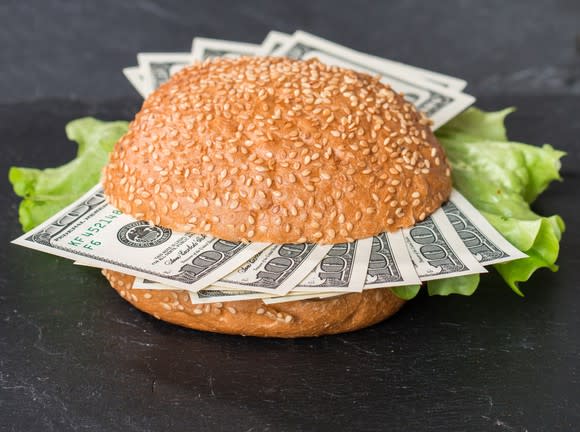3 Dividend Stocks With Better Yields Than McDonald's
If you want fast food, McDonald's Corporation (NYSE: MCD) might be a good option. But despite the stock's status as a Dividend Aristocrat, there are better alternatives than McDonald's if you're looking for high dividend yields.
We asked three Motley Fool investors to suggest good dividend stocks that beat McDonald's. Here's why they picked Cisco Systems (NASDAQ: CSCO), Anheuser Busch InBev (NYSE: BUD), and Gilead Sciences (NASDAQ: GILD).

Image source: Getty Images.
A high-yield tech stock
Tim Green (Cisco Systems): Shares of networking hardware company Cisco jumped in November after the company guided for a return to revenue growth after two years of declines. Cisco's ongoing shift toward software, subscriptions, and recurring revenue has acted as a headwind, but those investments appear to be finally paying off.
Despite the higher stock price, Cisco is still an attractive dividend stock with a yield of 3.15%. Cisco doesn't have the longest dividend track record -- the company only began paying a dividend in 2011. But it has raised that dividend consistently. The latest increase came earlier this year, when its quarterly payment was bumped up by 11.5%.
Cisco's payout ratio, the percentage of earnings that goes toward the dividend, has been climbing, although it's not yet high enough to be concerned about a dividend growth slowdown. Cisco produced adjusted earnings of $2.39 in fiscal 2017, putting the payout ratio based on that number at 48.5%. There's still some room to grow the dividend even if earnings growth remains sluggish.
Shares of Cisco still aren't particularly expensive, trading at about 15.5 times adjusted earnings, a number that doesn't factor in the mountain of cash sitting on the balance sheet. Throw in a 3.15% dividend with room to grow, and you have a value dividend stock worth checking out.
Brewing income for shareholders
Maxx Chatsko (Anheuser Busch InBev): Most investors are likely familiar with Anheuser Busch InBev. It owns over 500 brands worldwide, including seven of the top 10. It owns a formidable fleet of production assets that churn out consistent, high-quality products across the globe. It seems to be continuously looking to expand its portfolio by gobbling up smaller, but popular, regional brands.
It also happens to be one of the best dividend stocks on the market -- currently rewarding shareholders with a 3.4% yield. Although the stock is historically expensive at the moment with a price-to-earnings ratio of 45, that's mostly the result of short-term events encountered in 2016. Operational efficiency has improved in 2017 compared to the year-ago period. Margins and profits should continue to head higher as the integration with SABMiller nears its completion in October 2020, especially considering the dominant market share the combined company will own in the global beer market.
In addition to a gaudy dividend and room to optimize the business, Anheuser Busch InBev may actually be a more attractive stock in today's historically expensive stock market. It may seem counterintuitive at first to buy an expensive stock in an expensive market, but if the global economy cools off in the near future, beer stocks will become more valuable. Beer is, after all, a "recession-proof" product. Rain, shine, or recession, this is a dividend stock fit for any long-term portfolio.
From burgers to biotech
Keith Speights (Gilead Sciences): Most biotech stocks don't pay dividends at all. Gilead Sciences is one of the few exceptions. Its dividend currently yields 2.9%. And while it can't claim the long track record of dividend increases that McDonald's can, it has steadily grown its dividend. The biotech is also in better position for future dividend hikes than McDonald's is.
There's a fly in the ointment for Gilead, though. The company's revenue and earnings are in a tailspin due to falling sales for its hepatitis C virus (HCV) drugs. While competition is one factor, the bigger reason behind the HCV sales decline is that Gilead is a victim of its own success. Its HCV drugs have cured so many patients that there aren't enough new patients to sustain growth for its products.
Do these trends indicate that Gilead's dividend could be in jeopardy? I don't think so. The company still generated free cash flow of nearly $11.8 billion over the last 12 months. Gilead only spent a little over $2 billion on paying dividends during the period.
Also, Gilead CEO John Milligan recently predicted that 2018 could be "the beginning of a growth phase" for the company. He thinks that HCV sales will be smoother in the future than they've been over the past couple of years. In the meantime, the biotech's HIV franchise continues to dominate the market. Gilead also has a solid drug pipeline that should produce new winners.
More From The Motley Fool
6 Years Later, 6 Charts That Show How Far Apple, Inc. Has Come Since Steve Jobs' Passing
Why You're Smart to Buy Shopify Inc. (US) -- Despite Citron's Report
Keith Speights owns shares of Gilead Sciences. Maxx Chatsko has no position in any of the stocks mentioned. Timothy Green owns shares of Cisco Systems. The Motley Fool owns shares of and recommends Anheuser-Busch InBev NV and Gilead Sciences. The Motley Fool recommends Cisco Systems. The Motley Fool has a disclosure policy.

 Yahoo Finance
Yahoo Finance 